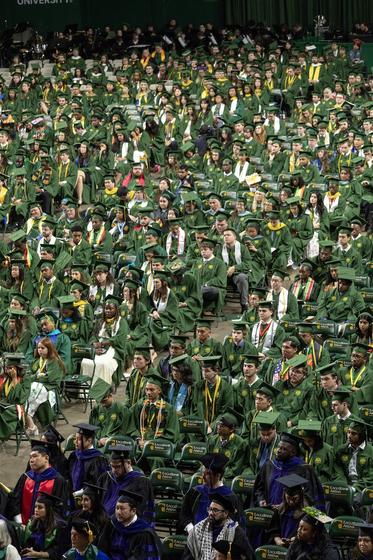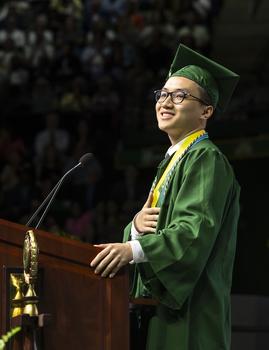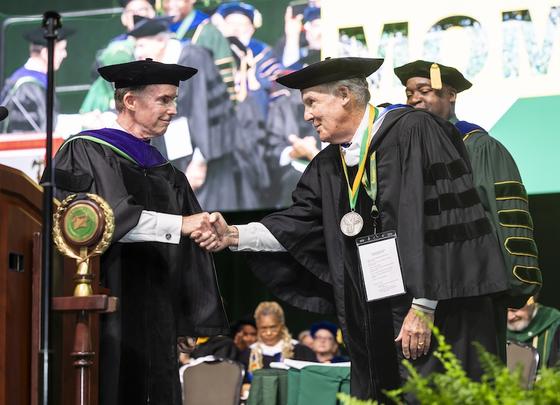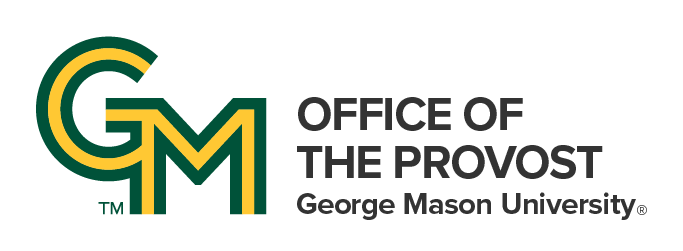George Mason University honored its largest ever graduating class at Spring Commencement, turning the event’s “This Is Your Moment” theme into a tassel-turning time to remember for a record-breaking class of more than 12,000 degree and certificate earners.
The ceremony, livestreamed on George Mason’s YouTube channel Thursday morning from EagleBank Arena, honored graduates from 117 countries and 49 states as well as the District of Columbia, Puerto Rico, and military installations.
George Mason University President Gregory Washington told graduates they are stepping into a time of “profound challenge and change” and urged each to determine their core values to help them make decisions, particularly the difficult ones.
“Your core values are your roots,” Washington said. “In ways large and small, they provide a foundation of support that will enable you to tackle challenges with a clear mind, a clear heart, and a clear conscience.
“When you know who you are, when you know what you stand for, you can proceed with purpose and dignity. Your values are your path. And your path will lead you to strategies and solutions.”

During the ceremony, Washington asked three different groups to stand and be recognized—first-generation graduates (which accounted for 25% of the class), students who came to George Mason via a community college, and students who are current or former military members, or military dependents. Each sizable group received a warm ovation and underscored the individual paths each graduate took to earning their degree.
One of the most noteworthy singular paths that Washington shared was the one taken by Yevin Goonatilake, who in December became the university’s youngest graduate to earn a 4.0 GPA, at 15 years old. This spring, at 16, he became the youngest person in university history to earn a master’s degree (computer science), a feat that elicited astonishment from graduates and attendees alike. His path will continue at George Mason as he pursues his PhD.
The guest speaker, Martina Cheung, president and CEO of S&P Global, advised the graduates to not think of their career arc as a ladder, because sometimes the wisest decision is to move laterally, not vertically. That has been her experience within S&P. She left the position as president of the market intelligence division to become president of the company’s credit rating agency, exposing her to other aspects of the business and to new colleagues inside and outside the organization.

“Looking back now, I realize leading two divisions instead of one actually better prepared me for becoming CEO,” Cheung said. “So the lesson here is: Don’t collect promotions. Collect experiences. That’s going to make you smarter, better prepared for what comes next, and it’ll give you a more reliable gut sense of what you ought to do when the answer isn’t especially clear.”
Board of Visitors Rector Charles “Cully” Stimson, JD ’92, presented Cheung with an honorary doctor of humane letters degree.
Student speaker Duy Ha Vu, a double major in public administration and business who moved to the United States from Vietnam, recalled personal triumphs, such as working at the Schar School of Policy and Government, founding a billiards club, and spending a semester at Mason Korea.
But Vu also recalled times of struggle and loneliness, particularly during the pandemic when he first arrived at George Mason.
“I stand before you not because I am the perfect student,” Vu said. “It’s because I never let those mistakes define me. And today, as I look at all of you in your caps and gowns, I see a room full of people who did that just that [too]. If you have made it this far, you have what it takes to go even further.”
Vu’s supporters included his mother, who had flown in from London to attend the ceremony.

Spring Commencement also provided an opportunity for the university to honor some of its most enduring champions. Stimson awarded the George Mason Medal, the university’s highest honorary award, to Robert E. Buchanan, a leading real estate developer who has served the university and Washington, D.C., civic causes for decades while also working with other business leaders to shape the region’s economic direction.
Receiving honorary degrees were civic and business leader Albert Dwoskin, another long-time university partner and advocate who has supported George Mason priorities across access, innovation, and inclusive excellence, and Carolyn Peterson, a passionate advocate for education and the arts whose steadfast support for George Mason also spans decades. Peterson accepted her honor at the Board of Visitors meeting earlier this month.
Scott Hine, BS Decision Science ’85, president of the George Mason University Alumni Association, welcomed the new graduates to a network of nearly 250,000 alumni and encouraged them to stay connected to the university by attending events, guest-speaking in classes, mentoring students, and supporting George Mason through philanthropy.
“There is likely an alum in any industry you are joining, and there is likely an alum in any location in which you’re settling,” Hine said. “This is an incredible network that you should leverage.”
Some 41% of undergraduate degree earners in the Class of 2025 are in STEM and health sciences fields, as are 48% of advanced degree earners, an indication of the university supplying workplace-ready talent in high-demand fields.
Related News
- December 18, 2025
- December 15, 2025
- May 15, 2025
- May 12, 2025
